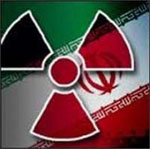 AP: Nuclear terrorism is officially the main topic for world leaders at a two-day summit in the Netherlands starting Monday. Notable absentees from the summit are North Korea and Iran, excluded by mutual consent.
AP: Nuclear terrorism is officially the main topic for world leaders at a two-day summit in the Netherlands starting Monday. Notable absentees from the summit are North Korea and Iran, excluded by mutual consent.
The Associated press
By Toby Sterling

AMSTERDAM (AP) — Nuclear terrorism is officially the main topic for world leaders at a two-day summit in the Netherlands starting Monday. In practice, the Ukraine crisis will likely overshadow those talks.
The Nuclear Security Summit in the Hague will form the backdrop for an emergency meeting of Group of Seven leaders on Russia’s annexation of Crimea. It’s a confrontation between Russia and the West reminiscent of the Cold War.
Russian President Vladimir Putin is not attending, instead sending Foreign Minister Sergey Lavrov, who is expected to hold talks with U.S. Secretary of State John Kerry.
But experts say frantic diplomacy focused on Ukraine shouldn’t divert from the goal of better security of nuclear material.
“International attention can turn in a moment,” said Deepti Choubey, a senior director at the non-government Nuclear Threat Initiative. “The attentions of terrorists do not.”
Delegations from 53 countries, including the leaders of the U.S., China and Japan, have started to arrive in the Hague. They will meet to negotiate on reducing and securing supplies, and keeping them out of terrorists’ hands. The G-7 includes the U.S., Britain, Germany, Japan, France, Italy and Canada.
Notable absentees from the summit are North Korea and Iran, excluded by mutual consent.
The summit is the third since US President Barack Obama launched the series in 2009 shortly after taking office, saying that reducing the risk of a terrorist attack with either a nuclear weapon or a “dirty bomb” was one of his most important international policy goals.
Because countries usually regard protecting nuclear weapons and facilities as a confidential sovereign matter, the summits center on individual commitments by participants and conclude with a non-binding accord.
Still, they already have reached tangible results.
The number of countries that possess enough highly enriched uranium or plutonium to make a bomb has fallen steadily, from 39 before the first conference in Washington in 2010 to 25 at the start of the Hague summit.
Piet de Klerk, the Dutch diplomat who chaired negotiations before the summit, says a further large drop in numbers is unlikely.
But he says The Hague closing accord will likely include a new commitment to reduce plutonium stores. That is particularly relevant for Japan, which owns a large plutonium stockpile even as it reevaluates its use of nuclear power in the wake of the 2011 Fukushima disaster.
Additionally, the Netherlands, with help from the U.S. and South Korea, is weaving together all existing nuclear arms treaties, agreements and voluntary guidelines for military, industry and civilian use into a single package of “best practices” for nuclear security. The three host nations and an unknown number of others will vow to adhere to this package as much as possible.
Kenneth Luongo, of the Partnership for Global Security, said that the willingness of countries to commit to “essentially what’s already on the books” will act as a litmus test to show which countries are taking security seriously.
“I would hope that by 2016 everybody would be on board,” he said.
What’s likely to be left for a final summit back in Washington in 2016 is a mechanism for countries to request a confidential independent review of their security practices, presumably conducted by the International Atomic Energy Agency.
While Ukraine is likely to dominate diplomacy behind the scenes in The Hague, it already is a nuclear success story.
The country voluntarily gave the nuclear weapons housed on its soil back to Russia after the collapse of the Soviet Union and following through on a 2010 summit promise, has recently disposed of its remaining stock of around 80 kilograms (176 pounds) of highly enriched uranium.
Choubey of the NTI said that underlines the importance of the process.
“How much more concerned would the world be today (about the crisis in Ukraine) if that material were still there?” she said.


